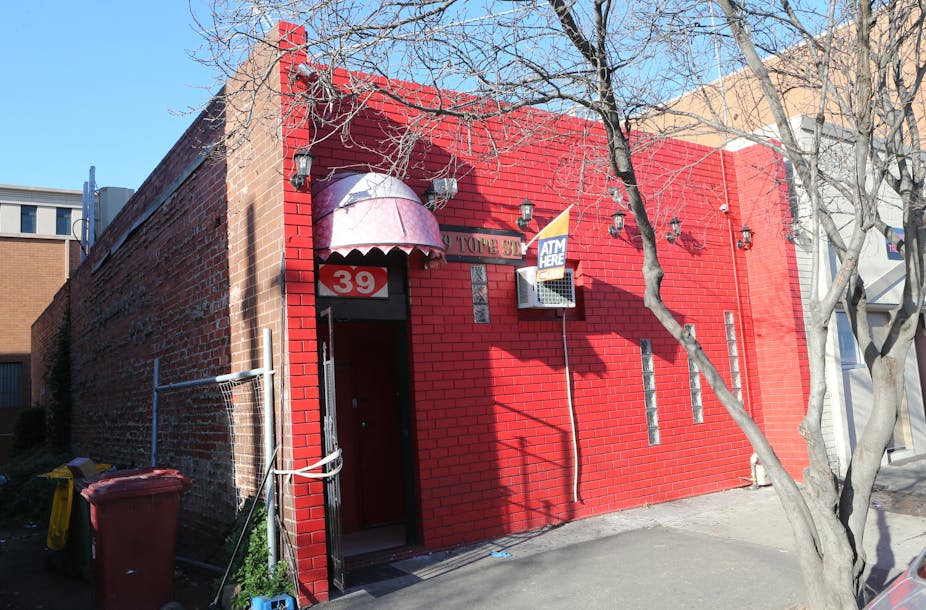Nationally and internationally, states adopt many different approaches to regulate brothels, ranging from legalisation to prohibition. But underlying all of these approaches is an ongoing assumption that there is something inherently problematic and undesirable about brothels.
Even in places that have legalised brothels, such as NSW, Victoria and Queensland in Australia, Nevada in the US and New Zealand, a strong sense of “NIMBYism” remains.
Particular fears about brothels include that they are bad neighbours because they cause crime and impact negatively on amenity. There have not been many studies specifically on the impacts of brothels, and most of these studies have been done in jurisdictions where brothels are illegal or heavily restricted.
However, recent studies in places where brothels can operate lawfully suggest that they are not such bad neighbours after all.
Myth: brothels cause crime
A big fear about brothels is that they cause crime, either as victims or perpetrators. However, despite these claims, since the decriminalisation of the industry in NSW in 1995, there is no evidence to support the notion that brothels cause crime.
The fear of crime is in part due to the history of brothels as unlawful, hence the association of these types of businesses with organised crime. With decriminalisation, these historic conditions no longer exist.
One of the concerns about crime is that clients and brothels were likely to be cash-rich and thus targets for robberies, but the increased use of credit cards has reduced this issue. Planning powers can also be used to ensure appropriate security such as guards and CCTV to protect against crime.
Legalisation also means that brothels, workers and clients are able to turn to the law for protection. This means that threats and menaces are less effective.
For example, a brothel owner in Parramatta reported to police that she had been the subject of bikie gang threats accompanied by promises of protection. The council relied upon this as evidence of the inherent unlawfulness of brothels.
In contrast, this demonstrates an advantage of legal status, albeit in its infant form. Rather than succumbing to bikie gang threats, the brothel owner was able to – and did – report the threats to the police and sought and received protection from existing legal institutions.
Accordingly, with the decriminalisation of the sex industry in NSW, the historic reasons for an association with illegality no longer exist.
Myth: brothels are disruptive to the community
A major fear about brothels is that they will be disruptive to the community: that they will cause problems in terms of noise, parking, lighting and the “vibe” of the area. These concerns all fit in under the category of “amenity” in planning law.
Along with some other academics, I undertook a survey in 2012 of 401 people living within a 400-metre radius of sex services premises in the City of Sydney and Parramatta local government areas.
Surveyed residents were asked if they were aware of any brothels in their area. If they answered yes, respondents were asked to rank the overall effect of the brothel on their local area.
In total, almost half (44%, 173 out of 401) of those surveyed were unaware that they lived near a brothel. Of the remaining survey respondents who were aware of brothels, just over half (53%, 122 out of 228) stated that the business had no effect (positive or negative) upon the local area.
Within the remaining half, nearly as many residents rated the overall impact positively (24%, 55 out of 228) as rated it negatively (27%, 62 out of 228). Accordingly, just under three-quarters of the residents surveyed (74%, 296 out of 401) either experienced no effects as a consequence of the nearby brothel or did not know of its existence. This suggests that brothels have minimal amenity impacts.
This result has also been confirmed in Queensland. In the decade-long history of the licensed sex industry in Queensland, there has not been a single complaint from any person regarding the impact on amenity of any operating brothel in the state. Licensed brothels have no appreciable impact on community amenity.
What can we learn?
Councils can utilise existing strategies such as locational restrictions, policies about size, operating hours, signage, structural approaches and management plans to ensure minimal amenity impacts. If a brothel does have negative impacts on amenity, then councils have general powers and powers specific to sex services premises to respond.
Governments need to stop relying on out-of-date information and unfounded fears based on historic constructions of brothels as illegal. Instead, brothels can and should be regulated in the same way as other legitimate businesses. There is nothing inherently criminal or disorderly about the sex industry.

